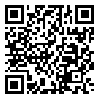Volume 20, Issue 3 (Autumn 2025)
Salmand: Iranian Journal of Ageing 2025, 20(3): 386-399 |
Back to browse issues page
Download citation:
BibTeX | RIS | EndNote | Medlars | ProCite | Reference Manager | RefWorks
Send citation to:



BibTeX | RIS | EndNote | Medlars | ProCite | Reference Manager | RefWorks
Send citation to:
Rostami M, Bulut S, Saadati N, Saadati S A, Seyed Alitabar S H, Zadhasn Z, et al . Relationship of the Sense of Coherence and E-health literacy With Health Anxiety in Older Women. Salmand: Iranian Journal of Ageing 2025; 20 (3) :386-399
URL: http://salmandj.uswr.ac.ir/article-1-2827-en.html
URL: http://salmandj.uswr.ac.ir/article-1-2827-en.html
Mehdi Rostami *1 

 , Sefa Bulut2
, Sefa Bulut2 

 , Nadereh Saadati3
, Nadereh Saadati3 

 , Seyed Amir Saadati4
, Seyed Amir Saadati4 

 , Seyed Hadi Seyed Alitabar5
, Seyed Hadi Seyed Alitabar5 

 , Zohreh Zadhasn5
, Zohreh Zadhasn5 

 , Parichehr Mehdiabadi6
, Parichehr Mehdiabadi6 

 , Kamdin Parsakia5
, Kamdin Parsakia5 




 , Sefa Bulut2
, Sefa Bulut2 

 , Nadereh Saadati3
, Nadereh Saadati3 

 , Seyed Amir Saadati4
, Seyed Amir Saadati4 

 , Seyed Hadi Seyed Alitabar5
, Seyed Hadi Seyed Alitabar5 

 , Zohreh Zadhasn5
, Zohreh Zadhasn5 

 , Parichehr Mehdiabadi6
, Parichehr Mehdiabadi6 

 , Kamdin Parsakia5
, Kamdin Parsakia5 


1- Department of Psychology and Counseling, KMAN Research Institute, Ontario, Canada. & Department of Rehabilitation, York Rehab Clinic, Toronto, Canada. , mehdirostami@kmanresce.ca
2- Department of Counseling Psychology, Counseling Center, Ibn Haldun University, Istanbul, Turkey.
3- Department of Psychology and Counseling, KMAN Research Institute, Ontario, Canada. & Department of Rehabilitation, York Rehab Clinic, Toronto, Canada.
4- Department of Clinical Science, School of Health Studies, Western University, Ontario, Canada.
5- Department of Psychology and Counseling, KMAN Research Institute, Ontario, Canada.
6- Department of Positive Psychology, School of Psychology, University of East London, London, United Kingdom.
2- Department of Counseling Psychology, Counseling Center, Ibn Haldun University, Istanbul, Turkey.
3- Department of Psychology and Counseling, KMAN Research Institute, Ontario, Canada. & Department of Rehabilitation, York Rehab Clinic, Toronto, Canada.
4- Department of Clinical Science, School of Health Studies, Western University, Ontario, Canada.
5- Department of Psychology and Counseling, KMAN Research Institute, Ontario, Canada.
6- Department of Positive Psychology, School of Psychology, University of East London, London, United Kingdom.
Abstract: (3043 Views)
Objectives This study aims to investigate the relationship of the sense of coherence and e-health literacy with health anxiety in older women.
Methods & Materials This is a cross-sectional study on 350 older women from Richmond Hill, Ontario, Canada, who were selected using a convenience sampling method. The health anxiety inventory (HAI), the sense of coherence scale (SOCS), and the eHEALS were employed to collect data. Data analysis was done using the Pearson correlation test (to evaluate the relationships between variables) and multiple linear regression (to identify predictors of health anxiety), conducted in SPSS software, version 27.
Results The participants’ mean age was 71.43±5.62 years. The sense of coherence (r=-0.35, P<0.001) and e-health literacy (r=-0.42, P<0.001) had a significant negative correlation with health anxiety. Regression analysis showed that both sense of coherence and e-health literacy significantly predicted the health anxiety, with e-health literacy having a stronger impact (β=-0.42, t=-7.89, P<0.001) compared to the sense of coherence (β=-0.43, t=-7.00, P<0.001). The model explained 22% of the variance in health anxiety (R²=0.20, F=4.89, P=0.003).
Conclusion The sense of coherence and e-health literacy are significantly associated with health anxiety in older women. Enhancing the sense of coherence and e-health literacy may be effective in mitigating the health-related anxiety in older women.
Methods & Materials This is a cross-sectional study on 350 older women from Richmond Hill, Ontario, Canada, who were selected using a convenience sampling method. The health anxiety inventory (HAI), the sense of coherence scale (SOCS), and the eHEALS were employed to collect data. Data analysis was done using the Pearson correlation test (to evaluate the relationships between variables) and multiple linear regression (to identify predictors of health anxiety), conducted in SPSS software, version 27.
Results The participants’ mean age was 71.43±5.62 years. The sense of coherence (r=-0.35, P<0.001) and e-health literacy (r=-0.42, P<0.001) had a significant negative correlation with health anxiety. Regression analysis showed that both sense of coherence and e-health literacy significantly predicted the health anxiety, with e-health literacy having a stronger impact (β=-0.42, t=-7.89, P<0.001) compared to the sense of coherence (β=-0.43, t=-7.00, P<0.001). The model explained 22% of the variance in health anxiety (R²=0.20, F=4.89, P=0.003).
Conclusion The sense of coherence and e-health literacy are significantly associated with health anxiety in older women. Enhancing the sense of coherence and e-health literacy may be effective in mitigating the health-related anxiety in older women.
Type of Study: Research |
Subject:
Psychology
Received: 2024/04/07 | Accepted: 2024/08/12 | Published: 2025/10/01
Received: 2024/04/07 | Accepted: 2024/08/12 | Published: 2025/10/01
Send email to the article author
| Rights and permissions | |
 |
This work is licensed under a Creative Commons Attribution-NonCommercial 4.0 International License. |





